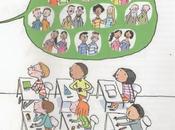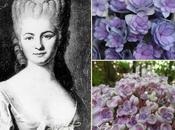Jo Walton è un'autrice di fantasy e science fiction di origine gallese che attualmente risiede a Montreal, in Canada, con il marito e il figlio. Nata nel 1964, la sua prima opera è stata The King’s Peace (2000) seguita da The King’s Name (2001). Nel 2002 ha vinto il John W. Campbell Award come Miglior Scrittore Esordiente e da quel momento non ha più smesso di pubblicare romanzi, tra cui ricordiamo Tooth and Claw che le ha fruttato nel 2003 il World Fantasy Award per il miglior romanzo e naturalmente Among others - Un altro mondo, che viene oggi pubblicato in Italia da Gargoyle dopo aver vinto l'Hugo e il Nebula Award per il miglior romanzo.
Il romanzo
L'intervista
Il testo dell'intervista in lingua originale lo trovate in fondo al post.
Scroll for english version.
Salve Jo, grazie per quest'opportunità di chiacchierare con te a proposito del tuo ultimo romanzo "Un altro mondo", che mi ha davvero colpita.
1. In "Un altro mondo" si racconta la storia di una fan di fantascienza che vive in un mondo popolato da creature fatate. In molti hanno commentato che questo romanzo conferma la commistione fra fantascienza e fantasy, sebbene i fan più accaniti dei due generi si ostinino a considerarli totalmente separati. Che cosa ne pensi? Fino a che punto fantasy e fantascienza sono connessi (se lo sono)?
Beh, storicamente sono stati scritti dagli stessi autori e letti dagli stessi lettori. Penso sia utile avere una più ampia definizione di genere che li includa entrambi -- spesso ciò che vogliono i lettori è essere diversi, singolari.
Nel libro è presente una domanda: "Chi preferiresti incontrare, un Plutoniano o un elfo?". Ecco, questa è una domanda su fantascienza e fantasy, il mito e il futuro. Certamente si tratta di due cose diverse ma che hanno molto in comune se le si confronta entrambe con la nostra realtà di tutti i giorni.
2. Mori, la protagonista di "Un altro mondo", divora praticamente ogni pezzo di sci-fi su cui riesce a mettere le mani. Come molti lettori ho particolarmente gradito veder citati così tanti titoli che mi sono piaciuti e mi sono anche fatta una lista di quelli che non ho letto ma potrebbero interessarmi. Avevi pianificato il tuo romanzo come un omaggio (alcuni hanno detto "una lettera d'amore") alla fantascienza o è stata un'inevitabile conseguenza della storia che volevi raccontare? Tra i libri letti da Mori, quali sono i tuoi preferiti?
Una delle caratteristiche del romanzo è che è semi-autobiografico per quanto concerne il rapporto di Mori con i libri. Mori legge per avere mezzi con cui affrontare il mondo, i suoi problemi nell'universo fantastico e quelli nel mondo reale. Esattamente ciò che ho fatto io da ragazzina. Non legge solo fantascienza, ma principalmente è la fantascienza che l'aiuta e l'attira.I miei preferiti... beh, Tolkien, sempre, e anche Le Guin e Delany sono ancora tra i miei preferiti. Ma non ho mai avuto l'intenzione di creare per gli altri una lista di libri da leggere -- Mori sta ancora sviluppando il proprio gusto personale, per cui legge anche un po' di spazzatura lungo la strada.
3. Una delle caratteristiche più interessanti di questo romanzo è il modo in cui viene trattata la magia: non ci sono bacchette magiche o incantesimi e spesso gli eventi magici sono così evanescenti che potrebbero tranquillamente essere scambiati per destino o mere coincidenze. Cosa ti ha ispirato questo approccio "discreto", così diverso da ciò che siamo abituati a vedere nei fantasy moderni? Spesso nel libro dici che Il signore degli anelli è il libro preferito di Mori e che Tolkien "aveva veramente capito la magia": il suo lavoro ha influenzato la tua visione della magia?
In effetti non c'è molta magia esplicita in Tolkien, sebbene i suoi imitatori avessero la tendenza a inserirne molta di più.
Stavo scrivendo di questo mondo. I libri che cercano di infilare la magia nel nostro mondo spesso mi infastidiscono perché, se la magia funzionasse veramente nel modo in cui viene descritta, allora sarei stata un'idiota a non averla notata, e non sono un'idiota. Volevo un impianto magico che fosse perfettamente integrato con la nostra realtà, invisibile e impercettibile -- non falsificabile, facilmente confutabile. Volevo qualcosa di cui la gente non potesse dire "Non è così che funziona".
4. Devo ammettere che spesso, durante la lettura del libro, mi sono chiesta se Mori fosse veramente capace di eseguire incantesimi e vedere le fate o se non fosse semplicemente un modo per riuscire ad affrontare gli eventi traumatici della sua esistenza. Questa ambiguità era nelle tue intenzioni?
5. Mi è molto piaciuto il modo in cui l'amore di Mori per i libri influenza la sua vita, aiutandola a farsi nuovi amici e plasmando il suo modo di pensare. E' stato lo stesso anche per te o concordi con chi dice che leggere è solo un modo per sfuggire la realtà?
Ecco, è esattamente questo il punto, se i libri l'aiutano a sfuggire alla realtà, lo fanno fornendole una lima con cui segare le sbarre della sua prigione, non semplicemente tramite sogni a occhi aperti. Ci sono molti modi per fuggire.
6. Quando il racconto inizia l'evento principale della vita di Mori, il confronto finale con la madre e la perdita della sua gemella, è già avvenuto. L'impressione per il lettore è che tu abbia iniziato la storia laddove molti autori avrebbero posto la parola fine. Personalmente mi è sembrato un approcio geniale ma anche un po' rischioso: perché ti sei focalizzata su quest'aspetto del racconto? Non avevi paura di deludere il lettore?
Mi interessava davvero molto parlare delle conseguenze di un'epica battaglia magica. Mi interessa molto di più ciò che accade al termine delle storie convenzionali, piuttosto che raccontare nuovamente quelle storie. Non avevo paura di deludere il lettore. Il lettore non ha bisogno di quel tipo di storia, è già stata raccontata in precedenza, per cui l'ha già letta e può colmare il vuoto degli eventi da solo.
Ma non direi che ciò che è accaduto a Mori è l'evento più importante della sua vita. Ha solo quindici anni, ha la possibilità di fare molte altre cose più significative.
7. Sia la madre che il padre di Mori si qualificano come cattivi genitori e in generale i suoi legami famigliari sono piuttosto particolari. Alcuni dei parenti più vicini ignorano totalmente le sue sofferenze e i problemi che ha con la madre, mentre spesso ella riceve aiuto da lontani parenti o persino da perfetti sconosciuti. C'è in questo una tua posizione sulla famiglia come istituzione in generale? Ritieni che la società moderna abbia dimostrato il fallimento della "famiglia tradizionale" come fonte di amore incondizionato per tutti i suoi membri?
8. Sono rimasta un po' scioccata dalla sequenza del libro in cui Daniel, ubriaco, tenta di baciare la figlia e di infilarsi nel suo letto. Ciò che mi ha lasciata perplessa è stato il fatto che Mori non si è mostrata particolarmente scandalizzata e il fatto è stato presto accantonato da entrambi. Puoi spiegare meglio questa scena e perché Mori non ha chiesto spiegazione a Daniel per le sue azioni?
Per anni non si è potuto parlare di queste cose, ora si può, ma da un solo punto di vista, ovvero come se si trattasse della cosa peggiore che possa accadere a una persona. Per molte persone è così, ma per altre è solo una cosa che gli è capitata. Volevo parlarne in questo modo: uno dei temi principali del libro è appunto che ci possono capitare brutte cose e che le si può superare, si può andare avanti.
Un'altra cosa che c'è da dire riguardo è che i libri influenzano la nostra visione del mondo e questo non è sempre un bene. Mori ha letto in Lazarus Long, l'immortale di Robert Heinlein che l'incesto è ok, ed effettivamente dice proprio questo. Ciò ha influenzato la sua visione al riguardo, perché ha fiducia in Heinlein, ma su quell'argomento proprio non dovrebbe averne. Per cui ecco una cosa negativa imparata dai libri, per bilanciare tutte le cose positive. Ho partecipato a un comitato di valutazione su Heinlein una volta e c'era gente che diceva che questo passaggio del suo romanzo è innocuo. Non lo è.
Ma non affronta Daniel su quanto accaduto perché il loro rapporto è fragile e perché è stata affidata a lui dalle autorità e ha solo quindici anni. Per quanto nel libro non sia una figura autoritaria, ha comunque una forma di autorità su di lei ed essendo ancora quindicenne non può pensare di vivere da sola. Per cui è complicato.
9. Ho adorato la protagonista del romanzo. Hai descritto una quindicenne molto diversa da quelle che siamo abituate a vedere in letteratura, soprattutto negli young adult: è intelligente, coraggiosa, indipendente e non ossessionata dall'idea di trovare (e sposare) il suo vero amore. Ritieni che le teenagers siano sottovalutate nei romanzi moderni? Sono descritte come più superficiali di quanto non siano in realtà?
Sì, sono d'accordo. Conosco alcune adolescenti che sono davvero fantastiche, totalmente diverse dagli stereotipi. E un sacco di persone mi hanno detto di essere state come Mori da ragazzine. Cerchiamo di fare un po' di distinzioni e allargare la rappresentanza!
10. Ho inoltre trovato la tua percezione della sofferenza fisica e psicologica della protagonista estremamente realistica. E' stato difficile avvicinarsi e descrivere una tale condizione? Sei stata influenzata dalla tua esperienza personale?
Sì, molto. E sì, è stato difficile e doloroso rivivere i miei ricordi di adolescente.
11. Oltre al tuo amore per la fantascienza, "Un altro mondo" mostra il tuo amore per la tua terra natia, il Galles. Quanto c'è in questo libro del Galles in cui sei cresciuta? Il Galles possiede davvero quell'atmosfera fatata che si respira nel romanzo?Non credo di aver descritto il Galles come "fatato", o almeno non più fatato di un sacco di altri posti. Ci sono posti totalmente privi di magia -- un mio amico, parlando di Los Angeles, raccontava che sulle cartine erano soliti scrivere "qui ci sono i draghi", e Los Angeles è uno dei posti più privi di draghi che io abbia mai visto. Ci sono posti senza draghi e dovremmo evitare di viverci. Ma il tipo di atmosfera fatata che ho fatto diventare magia vera e propria nel libro si può trovare in molti posti. Non sono stata dappertutto, ma non credo di aver mai visto un posto in Italia che ne fosse privo.
12. Una domanda sul titolo originale del romanzo, Among Others, ovvero Tra gli altri. A mio modo di vedere "gli altri" potrebbero essere sia le creature fatate che popolano la realtà di Mori che tutte quelle nuove persone che entrano nella sua vita dopo l'incidente e con cui deve imparare a instaurare un nuovo rapporto superando la sua naturale diffidenza. E' corretto?
Sì, lo è, e sicuramente miravo a questa doppia interpretazione con questo titolo.
13. E infine, perché hai ambientato il libro nel 1979 invece che oggi? hai scritto questo romanzo in particolare per coloro che erano adolescenti all'epoca? Lo chiedo perché oggi il fantasy è molto più di moda rispetto agli anni '70, ritieni che il lettore moderno possa ancora identificarsi con il senso di isolamento provato da Mori come fan di fantascienza?
Non credo che i lettori moderni possano aver questo problema. Persone di tutte le età e di tutti i generi sembrano apprezzare "Un altro mondo".
L'ho ambientato nel 1979 perché ho attinto alla mia esperienza personale ed è ad allora che risalgono i fatti. Non mi aspetto che un adolescente di oggi venga plasmato dagli stessi libri -- Harry Potter ha avuto un impatto enorme per questa generazione, per esempio. Ma la vera differenza la fa internet. Nessuno ora è isolato come lo era Mori nel 1979, perché possiamo trovare online persone a cui piacciono le nostre stesse cose. Quindi questa è una storia su un luogo preciso in un preciso momento storico.
14. Il nostro blog ha appena dedicato uno speciale al Premio Hugo per il Miglior Romanzo. "Un altro mondo" ha vinto il premio l'anno scorso, insieme al Nebula Award e al British Fantasy Award. Cos'hai provato quando ti è stata comunicata la vittoria? Vincere l'Hugo è diverso da vincere il Nebula o il British?
Sì, lo è. E' sempre splendido ricevere un premio, perché è un riconoscimento e una conferma che ad altre persone è piaciuto il tuo lavoro, ma l'Hugo è davvero speciale. Sono rimasta assolutamente stupefatta dalla vittoria e senza parole dall'emozione. Ancora provo queste sensazioni quando lo guardo sulla mia scrivania, wow.
Grazie infinite per il tuo tempo e la tua gentilezza!
Grazie a te per queste acute domande, mi ha fatto molto piacere che tu abbia apprezzato il libro.
English version1. In “Among Others” you tell the story of a sci-fi fan who lives in a world populated by fantastic creatures. Many have commented that this book confirms the disappearance of borders between two literary genres, SF and fantasy, even if the keenest fans still consider them as two completely separate worlds. What do you think about this? To what extent are SF and fantasy connected (if they are)?
Well historically they have often been written by the same writers, and read by the same readers. I think it's useful to have a wider genre term that encompasses both of them -- often what readers want is strangeness. There's a question in the book "Which would you rather meet, an elf or a Plutonian?" That's a question about SF and fantasy, myth and the future. Certainly those things are different, but they also have a lot in common once you start to contrast both of those things with every day reality.
2. Mori, the protagonist of "Among Others", practically devours every piece of SF she can lay her hands on. Like many readers, I really enjoyed seeing so many titles I liked listed and discussed and I made a list of the ones I didn't know and I want to read. Did you plan to make your novel a homage (some have said a "love letter") to SF literature or was this just intrinsic of the story you wanted to tell? Among Mori's read, which are your favorites?
One of the aspects of this book that's semi-autobiographical is Mori's relationship to the books. She's reading to construct tools to deal with the world, with her fantasy problems and her real world problems. That's what I did as a teenager. She doesn't only read SF, but it's mostly SF that helps and appeals.
My favourites -- well, Tolkien, always, and Le Guin and Delany are still favourites. But I never intended the books she reads as a reading list for anyone else -- she's still in the process of forming her taste, and she reads some rubbish along the way.
3. One of the most intriguing features of this novel is that magic is treated in such unusual way: there aren't wands or magic words and often the concept of magic itself is so evanescent that it could be easily confused with destiny or mere coincidences. What inspired you to use this "discreet" approach, so different from the way magic is usually treated in modern fantasy? You often indicate that LOTR is one of Mori's favorite books and that Tolkien “really understood magic”: did his work influence your vision of magic?
There isn't much overt magic in Tolkien, though his imitators have tended to insert a lot more.
I was writing about this world. The books that try to put magic in this world often annoy me because if magic worked the way they describe I'd be an idiot to have missed it, and I'm not an idiot. I wanted a magic system that could be seamless and invisible and undetectable -- non-falsifiable, plausibly deniable. I wanted something where people could not say that it didn't work that way.
4.I have to admit that often, while reading the book, I asked myself if Mori was really capable of performing magic and seeing fairies or if it was just a way for her to cope with the traumatic events of her life. Did you actually look for this kind of ambiguity?
Oh, certainly, yes. I wanted that question in the reader's mind, But I thought that the reader would conclude that it was real -- Wim sees the fairies, and I intended that to be conclusive evidence that it was real.
5. I liked the way Mori's love for books influenced her life, helping her making new friends but also forming her way of thinking, was it the same also for you or do you share the belief that books are just means to escape reality?? Which books were more influential when you were growing up?
That's it exactly, if the books are helping her escape they're doing it by handing her a file to saw through the bars, rather than just a daydream. There's more than one way to escape.
6. When the story begins the main event of Mori's life, the confrontation with her mother and the loss of her twin sister, has already happened and the protagonist has to live with the consequences of it. It really felt as if you started the narration where many authors would have just seen an epilogue. I found this idea really brilliant but also a bit risky: why did you focus on this side of the story? Weren’t you afraid of disappointing the reader?
I was really interested in writing about the aftermath of a big magical conflct. I'm much more interested in what happens after the end of conventional stories than in retelling those stories. I wasn't afraid of disappointing the reader. The reader doesn't need that story. They know it already. They're read it before. They can fill it in for themselves. But I wouldn't say it was necessarily the main event of her life. She's only fifteen. She could go on to do a lot of even more significant things.
7. Both Mori's parents offer examples of bad parenting and all her family tree is highly unconventional. Some of her closest relatives seem oblivious to her suffering and to her difficulties with her mother while help often comes to her from people with whom she has only a distant relationship. Does this reflect your views about family as an institution? Do you think that modern society has proven the failure of the "traditional family" as a source of unconditional love for all it members?
I think a lot of families have let down a lot of kids. And other families have been wonderful. It's complicated. I'm not much for unconditional love, and I think a lot of cultural expectations of families require a kind of perfection that isn't humanly achievable.
8. I was a bit shocked by the passage in the book where Daniel, drunk, tries to kiss his daughter and to force himself in her bed. What mostly dumfounded me was that Mori didn't seem particularly outraged and the event was quickly forgotten by both of them. What were really Daniel’s motivations and why Mori didn’t confront him about his actions?
For years you couldn't talk about this kind of thing, and now you can, but you can only talk about it in one way -- as if it is the worst possible that can happen to the victim. It can be for some people. For other people, it can be just a thing. I wanted to write about it in that way. One of the themes of the book is that bad things can happen to you and you can go on from there.
The other thing about this is that books do shape your worldview and that isn't always good. Mori has read Heinlein in TIME ENOUGH FOR LOVE saying that incest is OK, and he really does say that. And that has affected her view of it, because she trusts Heinlein, and on that subject she really shouldn't. So that's a bad thing she has got from her reading, to balance the other things. I was on a panel on Heinlein once and people were saying this can't do any harm. It can.
But she doesn't confront Daniel about it because their relationship as family is fragile, and because she has been given to him by the authorities and she's still only fifteen. He's not a power figure within the book, but he does have that power, and she can't live on her own, she's only fifteen. So it's difficult.
9. I really appreciated the novel protagonist. You portrayed a fifteen-year-old very different from the ones we are used to see in literature, especially YA literature nowadays: she’s mature, smart, courageous, independent and really open-minded and not obsessed with the idea of finding (and marrying) her true love. Do you believe that teenage girls are misrepresented in modern novels? Are they believed to be shallower than they really are?
Yes. I know some teenage girls who are great, not at all like the stereotype. And lots of people have said to me that they were like Mori. Let's have some diversity and agency here!
10. Moreover, I found your insight of the protagonist's sufferance, both physical and emotional, strikingly realistic. Was it hard to approach and describe such delicate state of mind? Were you influenced by personal experience?
Yes, very much. And yes, it was difficult and painful to put myself back into my own teenage memories.
11. Besides your love for SF, “Among Others” shows your love for your country of origin, Wales. How much of the Wales you grew up in is in the book? Do you think that Wales really possesses the “enchanted” atmosphere you described in your novel?
I don't think I did show Wales as enchanted, or at least, not any more enchanted than a whole lot of places. There are places that lack enchantment -- a friend of mine talking about Los Angeles said that they used to write "here be dragons" on maps, and Los Angeles is the most dragonless place he had ever seen. There are dragonless places. We should avoid living in them. But the kind of enchantment that I extended out into literal magic in the book can be found in most places. I haven't been everywhere, but don't think I've been anywhere in Italy that lacks it.
12. A question about the novel title: I felt like "others" could relate both to the supernatural creatures who inhabit Mori's world and to all the new people in Mori's life (her father, her classmates, the kids in the reading group) with whom she has to overcome her diffidence and create new relationships. Do you think this is true?
Yes, that was certainly my intention with the title.
13. And finally, why did you set the book in 1979 instead of choosing a more contemporary setting? Is your book written specifically for those who were teenagers at the time? I ask this because fantasy nowadays is much more popular than in the seventies, do you think modern readers could still identify with the sense of isolation experienced by Mori as a SF fan?
Modern readers have no problem with this. People of all ages and genders seem quite comfortable reading AMONG OTHERS.
I set it in 1979 because I was using elements of my own experience, and that's when it happened. I don't expect a teenager today would be shaped by the same books -- Harry Potter has been huge for this generation, for instance. But the real difference is the internet. Nobody is as isolated now as Mori was in 1979, because we can find people to talk to online who care about the same things. It's a complete game-changer on that. So this is a story of a very specific time and place.
14. In October our blog has dedicated a series of articles to winner of the Hugo Award for Best Novel. “Among Others” won the prize last year, along with Nebula Award for Best Novel and the British Fantasy Award. What did you feel when you were communicated the victory? Is winning the Hugo different from winning the Nebula or the British Fantasy?
Yes. It's always delightful to be given any award, because it's a sign of recognition and that other people really like the book, But the Hugo is really special. I was absolutely amazed to win and thrilled beyond words. I still feel like that when I see it on the desk, wow.
I set it in 1979 because I was using elements of my own experience, and that's when it happened. I don't expect a teenager today would be shaped by the same books -- Harry Potter has been huge for this generation, for instance. But the real difference is the internet. Nobody is as isolated now as Mori was in 1979, because we can find people to talk to online who care about the same things. It's a complete game-changer on that. So this is a story of a very specific time and place.
Thank you for these perceptive questions and I'm very glad you liked the book.
Intervista di Valetta






